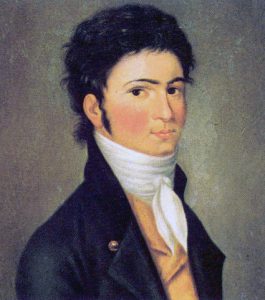Beethoven’s Prague Connection
By Erin Naillon
Beethoven, like Mozart before him, found Prague well worth a visit.

Beethoven in Prague
In 1796, just five years after Mozart’s death, fellow musical genius Ludwig van Beethoven visited Prague. During this time, he stayed in the ritzy Malá Strana area below Prague Castle. The building where he stayed, at 11 Lazenská Street, still stands, despite repeated floods over the centuries. It is now inseparably connected with the name of Beethoven.
Nerudova Street, running from Prague Castle down to Malá Strana, contains a building at Number 12 known as the House of the Three Violins. This is where Beethoven took his own violin to be repaired. To this day, the artwork of three violins decorates the front of the building over the entrance door. (The ground floor is now a beer hall.)
Sadly, it was this same year that Beethoven’s hearing began to deteriorate. He composed several new pieces, and it would be some years before he became entirely deaf, but the end was now approaching. In 1798, he premiered his Piano Concerto No. 1 in C major in Prague; he himself played the piece.
Beethoven in Teplice – a Mystery
Teplice was and is a Czech spa town, once also renowned for its marvelous gardens. It is now almost on the border between the Czech Republic and Germany. In the summer of 1812, Beethoven visited the spa on his doctor’s advice (he was now almost entirely deaf). This visit would have two important aspects. One was that Beethoven met philosopher Johann von Goethe.
The second was that Beethoven wrote a letter in Teplice, never mailed, that was discovered among his belongings only after his death in 1827. It reads, in part:
“My angel, my all, my very self…Why this deep sorrow when necessity speaks – can our love endure except through sacrifices, through not demanding everything from one another; can you change the fact that you are not wholly mine, I not wholly thine – Oh God, look out into the beauties of nature and comfort your heart with that which must be – Love demands everything and that very justly – thus it is to me with you, and to your with me. But you forget so easily that I must live for me and for you; if we were wholly united you would feel the pain of it as little as I…We shall surely see each other soon; moreover, today I cannot share with you the thoughts I have had during these last few days touching my own life – If our hearts were always close together, I would have none of these…wherever I am, there you are also – I will arrange it with you and me that I can live with you. What a life!!! thus!!! without you – pursued by the goodness of mankind hither and thither – which I as little want to deserve as I deserve it…Much as you love me – I love you more…my thoughts go out to you, my Immortal Beloved, now and then joyfully, then sadly, waiting to learn whether or not fate will hear us – I can live only wholly with you or not at all…Your love makes me at once the happiest and the unhappiest of men…Be calm – love me – today – yesterday – what tearful longings for you – you – you – my life – my all – farewell. Oh continue to love me – never misjudge the most faithful heart of your beloved.
ever thine
ever mine
ever ours”
This letter was the inspiration for the 1994 film Immortal Beloved. Like Amadeus before it, the film was shot in and around Prague.



